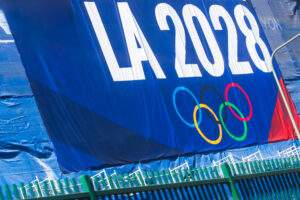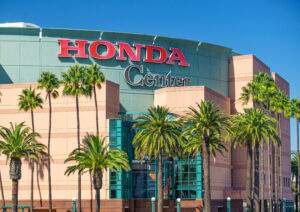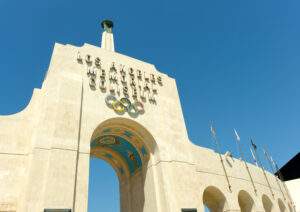From Neutral to Negotiable: The IOC’s shift to selling Olympic Venue Naming Rights
Published on November 4, 2025, at 11:13 a.m.
by Parker Schell
The Olympics are the highest threshold an athlete can reach. The games are also the biggest sports event for sponsorships. 21% of marketers worldwide will revolve their U.S. sponsorship efforts around the Olympics this year. Historically, the International Olympic Committee (IOC) enforced a “clean venue policy” that kept Olympic arenas free of commercial branding—but this year marks a major shift.
The IOC announced on Aug. 14 that it would be selling venue naming rights for the first time in the event’s history. This will allow corporate sponsors of the 2028 Olympic and Paralympic Games in Los Angeles to have their name appear on featured venues. LA28 and the IOC called the change a pilot program, and an IOC spokesman said the organization would “assess the relevancy for future hosts,” but the policy change has drawn both praise and criticism from fans of the Olympics.

Some fans have been pushing for more modernization of the games for years, given that this will serve as the largest raise in commercial revenue in sports, while others have expressed fear that this shift will lead to over-commercialization of the Games. It opens the door to major PR opportunities—and some notable risks—for LA28 and how the Games are marketed.
Naming rights will be offered first to the “TOP” sponsors. The Olympic Partner (TOP) program is the highest level of Olympic sponsorship, granting marketing rights to the Olympic and Paralympic Games and Olympic teams around the world to a select group of Worldwide Olympic Partners. These sponsors have much more exclusive access to the PR and marketing world of the Olympics.
This program was developed by the Los Angeles 1984 Organizing Committee, and these Games would serve as a higher-profile and more financially viable model for the IOC.
According to the IOC, 72% of the IOC budget comes from broadcast rights, with over half of that being the US-based NBC contract specifically. Dr. Andrew Billings, director of The Alabama Program in Sports Communication at The University of Alabama, pointed out that “as we see younger generations move from TV to other things that aren’t as easy to monetize, everyone in the Olympic structure is trying to find a more financially viable model for hosting and conveying the games.”
Younger generations are more likely to follow the Olympics via social media, rather than actually tuning in to the live broadcast. An article from The Sports Examiner highlights a LinkedIn post from Terrance Burns, veteran American observer, bid expert and Olympic sponsorship designer and marketer, stating that the criticism of the IOC’s announcement is an “overreaction” and “uninformed.”

One PR risk that this policy change poses for the IOC is brand integrity. Some are worried that with a big enough check, the venues could be sponsored by brands deemed controversial. Dr. Kenon Brown, co-director of the Beyond Sports Initiative at The University of Alabama, says that “remaining neutral and having some sense of integrity is going to be key when selecting which brands to work with.”
This type of corruption is certainly under a microscope, with many international committees having a history with such cases. In 2002, the Salt Lake Organizing Committee (SLOC) prompted allegations of bribery after it was revealed that more than a million dollars in gifts were given to IOC members leading up to the city’s successful bid to host the 2002 Winter Olympics.
Whether the IOC will turn away brands that pose a threat to their reputation is a question that is currently unanswered.
Another PR risk for the IOC is the public’s fear of eroding the Olympic Spirit of the Games through “over-commercialization.” Billings argues that this revenue increase will make it possible for more cities to be able to host the games, rather than rotating just a handful of cities. “The additional revenue stream probably is worth it for the long-term viability of the Olympics,” says Billings.

Some criticism stems from the athletes’ perspective. Brand sponsorship of venues poses potential risks of conflict with Rule 40,. an eligibility rule that defines what athletes can and cannot do with their personal sponsors during the Olympic Games. If conflict between personal sponsors and venue sponsors arise, more marketable athletes with already established, or the resources for, a professional PR team will have less trouble navigating this, while lesser-known athletes may face compliance issues. This deepens the visibility gap between top-tier and lower-tier athletes.
The Olympics have long been known for their neutrality and lack of commercialization, always being the “purest” of sporting events. Will they only look at financial returns, or will other metrics determine the success of this new territory?
It will certainly be interesting to see how the IOC measures this policy change.




